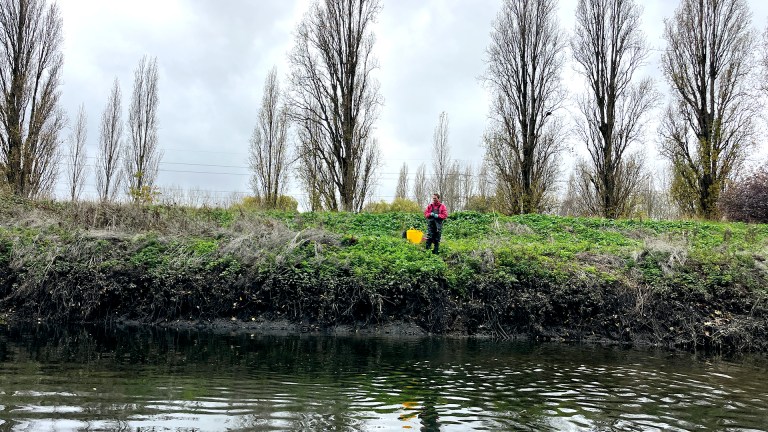As the draft legislation is at a late stage on its journey into law, the amendment will not go to the House of Commons for MPs to vote on. The defeat means the government must now introduce new legislation to change nutrient neutrality laws.
Wildlife and Countryside Link chief executive Dr Richard Benwell said: “I think it was good sense prevailing in parliament with peers from all parties recognising that you can have housing and you can have nature protection in one.
“I think they saw through the government’s last-minute proposals which were unnecessary and would have left long-term damage to environmental law. The problem was the government solution was both ineffective and a hatchet job on environmental law.
“So it’s absolutely right, that there’s a process now for quickly looking at options to get things moving in those few areas where, where there are holdups and to make sure that’s something that gives a strong preference for what local areas really need, and a strong preference for activities that work within the law.”
Nutrient neutrality laws were introduced by the EU in 2017 and ministers put the housing and climate crises on a collision course when it announced it was planning to rip up nutrient neutrality laws.
Gove said the EU rules had “held us back” while the government described the rules as “defective” and “red tape” blocking homes from being built.
Advertising helps fund Big Issue’s mission to end poverty
But Angela Rayner, Labour’s shadow housing secretary, criticised ministers’ plans to replace them
“The Tories have utterly failed in their attempt to score cheap political points with a flawed plan, which has now been humiliatingly rejected in the Lords,” she said.
“We stand ready to sit down with the government, housebuilders and environmental groups to agree on a workable solution to build the homes we need. If they refuse this opportunity, ministers have only themselves to blame.”
Meanwhile, Green peer Baroness Jenny Jones was asked to withdraw her comment after accusing the government of lying in yesterday’s Lords debate.
She said: “We were lied to in this House. Our government promised us repeatedly that there would be no lessening of environmental protection at any time. They promised us that and they lied. As a result of Brexit, we are now almost unprotected. Loads of us knew at the time that they were lying.”
The Home Builders Federation has pointed out that Natural England has issued advice to 74 local planning authorities blocking planning permissions to build an estimated 145,000 new homes since June 2019.
Advertising helps fund Big Issue’s mission to end poverty
HBF also said all residential development accounts for “5% of the nutrient issue” and has pointed the finger at water companies for polluting rivers more than developers.
Stewart Baseley, executive chairman of the HBF, said: “Amidst an acute housing shortage and with housing supply plummeting it is a damning indictment that after four years politicians have completely failed to find a solution.
“Despite the occupants of new homes making a negligible contribution to the issue, and house builders giving water companies over £1bn in the past three years alone, the impasse goes on.
“Extending the ban will do nothing to improve the shocking state of our rivers, polluted by agricultural run-off and the failings of water companies, but will exacerbate our housing crisis still further. With growing waiting lists, a generation unable to buy, local economies damaged, and jobs lost, the mishandling of this issue is a national disgrace.”
The debate on how to build more houses and protect the environment is unlikely to end here.
Anger remains among green campaigners who see the move as the government rowing back on promises to protect the environment and tackle river pollution.
Advertising helps fund Big Issue’s mission to end poverty
James Wallace, chief executive of River Action, said ministers must now invest in monitoring and enforcement to hold polluters to account. He added: “This ridiculous proposal should never have come to a vote.”
But Benwell told The Big Issue he remains optimistic following the Lords vote. He said: “It’s really positive to see how much parliamentarians have engaged in the detail of this and not been sucked into the politics of builders versus blockers, which was a false choice.”
River pollution: What is nutrient neutrality?
Nutrient neutrality regulations prevent additional pollution in rivers. The habitat regulations ensure a development plan or project does not lead to a net increase to the existing nutrients – nitrogen and phosphate pollution – in nearby waterways.
In practice, this impacts what can be built near water bodies. Agricultural activity can affect the amount of nutrients in water if fertilisers, animal waste or slurry is flowing into rivers.
Get the latest news and insight into how the Big Issue magazine is made by signing up for the Inside Big Issue newsletter
Building houses and other buildings can have an effect too. Untreated or partially treated sewage may be more likely to enter rivers above levels allowed under water companies’ permits due to development near waterways. Wastewater from development can also make its way into rivers and increase the nutrient count.
Advertising helps fund Big Issue’s mission to end poverty
For homes to be greenlit, developers must demonstrate they will not add to pollution, either by incorporating mitigation into designs through sustainable drainage or offsetting the issue with pollution reduction efforts in the local area.
Natural England already operates a nutrient mitigation scheme to offset the impacts on rivers. The government’s proposed plan included doubling the investment into this scheme to £280m after admitting there will be a “very small amount of additional nutrient discharge” linked to plans to build 100,000 homes between now and 2030.
Do you have a story to tell or opinions to share about this? We want to hear from you. Get in touch and tell us more.





